With cutting-edge technology evolving at the speed of light in today’s rapidly changing digital landscape, businesses are no longer content with raw data—they want actionable insights to remain one step ahead. Why Business Intelligence Tools? It is vital for B2B SaaS providers to help them make data-driven decisions. It will allow better collection of data, analysis of data, and visualization that would help to enable businesses to formulate better strategies and hence optimize performance.
Related Article: https://www.adlabz.co/top-10-landing-pages-of-2025-for-saas-startups
In this Blog, we will talk about the 10 Best Business Intelligence Tools for B2B SaaS companies. Whether you’re looking for powerful visualizations, an automated reporting tool, or real-time dashboards, you’ll find a tool on this list to suit your needs.
Jump to:
Business Intelligence (BI) in a Nutshell
Business intelligence refers to methods or tools that are used to sort, process, analyze, filter, and report on large amounts of business-related datasets. Though the primary power of analytics tools accurately predicts future trends, BI tools analyze current trends and thus aid in real-time decision-making within the organization.
Business intelligence categories typically include data collection, data analysis, and data visualization.
Data Gathering = Data collection from multiple platforms and from multiple data sources like customers, sales, or competitors. Data is scattered across various business intelligence (BI) tools pull the required data from these various channels and prepare them for analysis.
Data Analysis is the phase in which those numbers are crunched. Paradigms simplified and actionable BI tools employ algorithms and formulas to distinguish associations and patterns in the data so that complex information becomes understandable.
The last step is Data Visualization, where the meaningful data is visually represented in a meaningful way. This data is presented in BI tools through the use of charts, graphs, maps, or dashboards which make it easier to interpret and hence help make quicker decisions.
For B2B SaaS companies, BI tools in these categories can help improve operational efficiency and deepen understanding, and growth by gaining insights from large amounts of data. By identifying patterns that are not easily visible with traditional methods, BI tools enable SaaS businesses to make data-driven decisions, streamline processes, and support innovation.
What are Business Intelligence Tools?
Business Intelligence tools are software tools that collect, organize, and represent business information in a form interpretable by the end-user — most commonly dashboards, reports, and charts. These tools allow organizations to delve into massive amounts of data, track key performance indicators (KPIs), and make data-driven decisions that can help them grow and increase their profitability.
Business Intelligence (BI) tools provide multiple benefits for B2B SaaS companies. They elucidate customer behavior trends which can help you form better retention strategies. BI tools also help to analyze churn rates, campaigns, and upgrade overall sales performance.
Why do you need Business Intelligence Tools for B2B SaaS?
The B2B SaaS industry is a fast-paced and highly competitive landscape. Data-driven decision-making is imperative, instead of a luxury in such an environment. This is where Business Intelligence tools help accelerate the process for SaaS companies in collecting insights from multiple data sources, analyzing their key performance indicators, and making the right adjustments at the right time.
BI tools help to improve operational efficiency, customer satisfaction, and revenue growth, thus gaining great importance for B2B SaaS. Looking into business performance thoroughly through reports and dashboards, BI tools help SaaS companies spot opportunities for improvement and take advantage of new opportunities.
1. What Makes Tableau One of the Best Business Intelligence Tools?
The best BI tool in terms of data visualization capabilities is Tableau. Using its drag-and-drop interface, users can quickly build interactive dashboards and reports that help to make complex data more digestible and actionable.
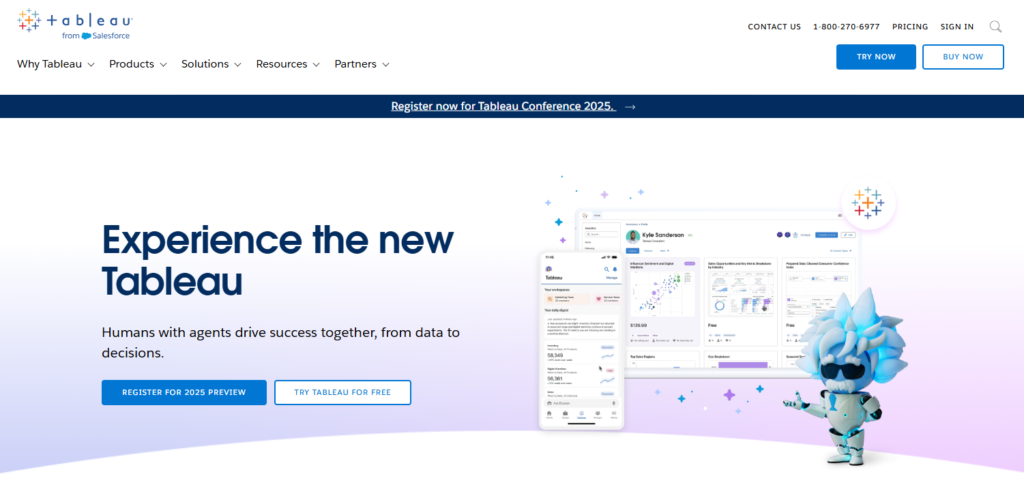
The integration of Tableau with various data sources is a powerful tool that enables SaaS companies to combine data from multiple departments and have a complete overview of their business. With its real-time data analysis capabilities, businesses can respond quickly to market trends and changes. The wide customization options allow users to customize the dashboard to their specific needs in Tableau allowing it to be a worth contribution for the data-driven decision making.
2. Why Power BI is a powerful tool to transform B2B SaaS Data Insights
Power BI concept Power BI is a Business Intelligence tool that is cost-effective as well as extremely powerful. Its real-time dashboards give up-to-date insights, and its AI-driven tools allow users to identify data patterns that could remain hidden.
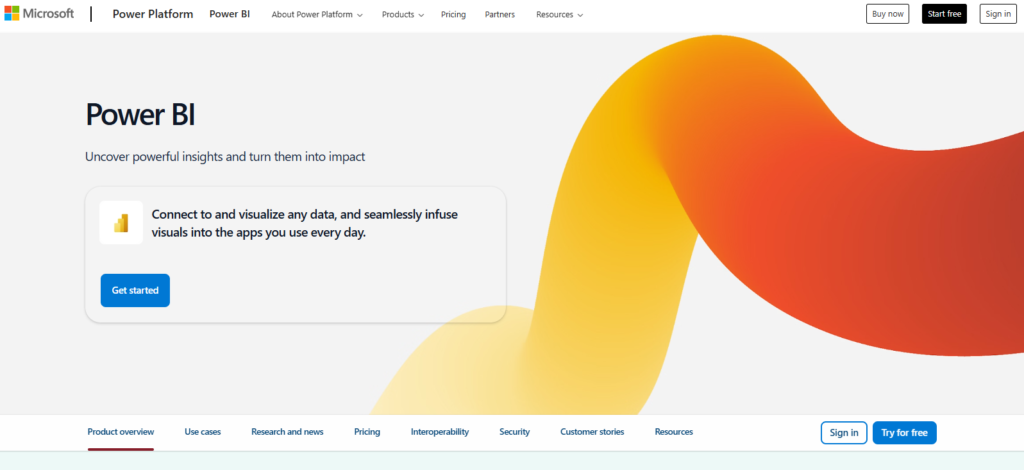
The deep integration of Power BI with other Microsoft products, including Excel and Azure, makes it a compelling option for SaaS organizations already operating within the Microsoft ecosystem. Its scalability allows it to adapt as the business grows, making it a perfect fit for both startups and large enterprises. This size and complexity make it challenging, as SaaS companies transform data into insights by using rich visual options mixed with an intuitive interface in Power BI.
3. Can Looker Help Drive Business Success for SaaS Companies?
Over the years, Looker has evolved its SQL-based modeling approach, and since joining Google Cloud has combined advanced analytics capabilities with what you expect from a multidimensional model. Modern BI tool that enables the user to build tailor-made data models according to their business model.
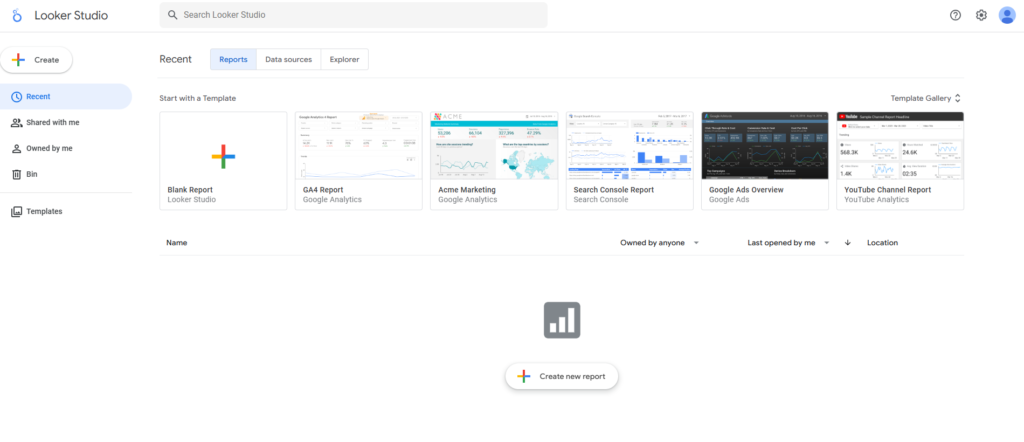
SaaS companies can utilize Looker’s real-time data exploration features to access and discover insights in their datasets. The tool also provides pre-built analytics templates that can be customized to monitor specific KPIs. Through a lens of customer data, product usage, and financial performance, Looker enables SaaS companies to act with confidence and make data-driven decisions.
4. The reasons why B2B SaaS Companies should use Qlik Sense
What sets Qlik Sense apart in the BI landscape is its associative data engine, which enables users to explore their data without being constrained by pre-defined queries. It enhances data exploration more relevant and interesting.
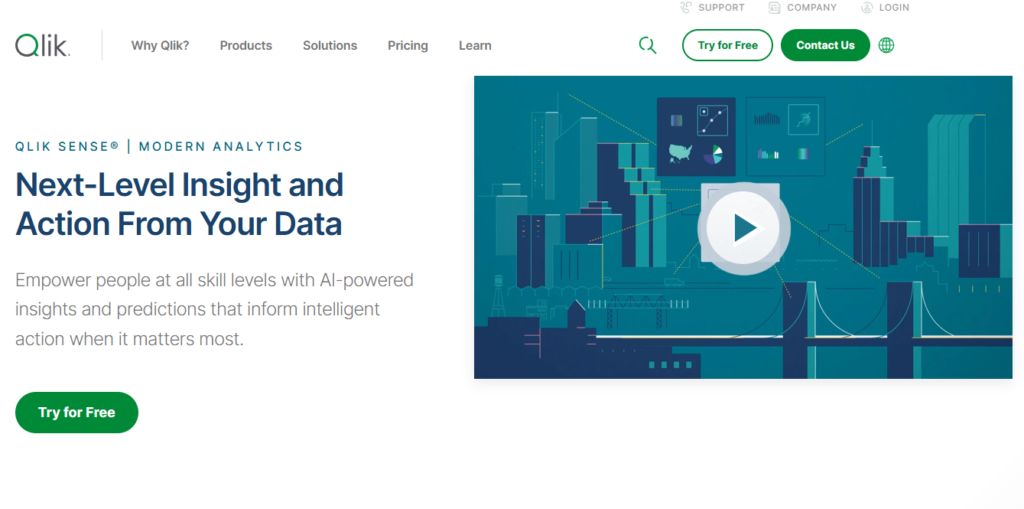
Qlik Sense empowers business users to independently discover actionable insights with its AI-based insights and self-service visualization capabilities. For B2B SaaS companies, it translates to making decisions at lightning speed and embracing a data-driven culture. The solution is particularly well-suited for SaaS providers thanks to its ability to process large datasets and provide real-time insights.
5. How Does Domo Simplify Data Management for SaaS Companies?
Domo is an all-in-one BI solution that integrates data handling, visualization, and collaboration on one platform. With over 1,000 out-of-the-box connectors, it is easy to integrate with multiple data sources.
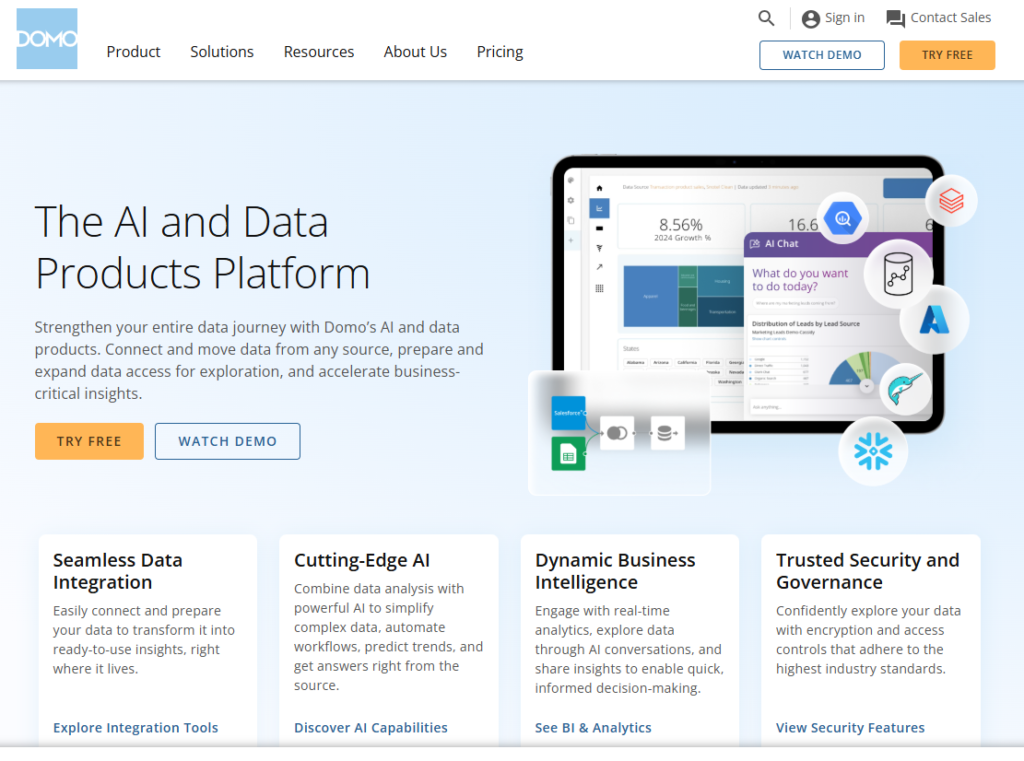
Domo’s real-time alerts and notifications ensure that teams are aware of key changes in business metrics. With mobile-friendly dashboards, users receive insights on the go, improving their agility and responsiveness. Domo is best suited for SaaS organizations seeking to improve data integration and inter-team collaboration.
6. Why is Sisense a Great BI Tool for SaaS Providers?
Sisense is known for its excellent management of large and complex datasets. The in-chip technology it possesses allows for quick data processing, which in turn enables timely analysis and reporting.
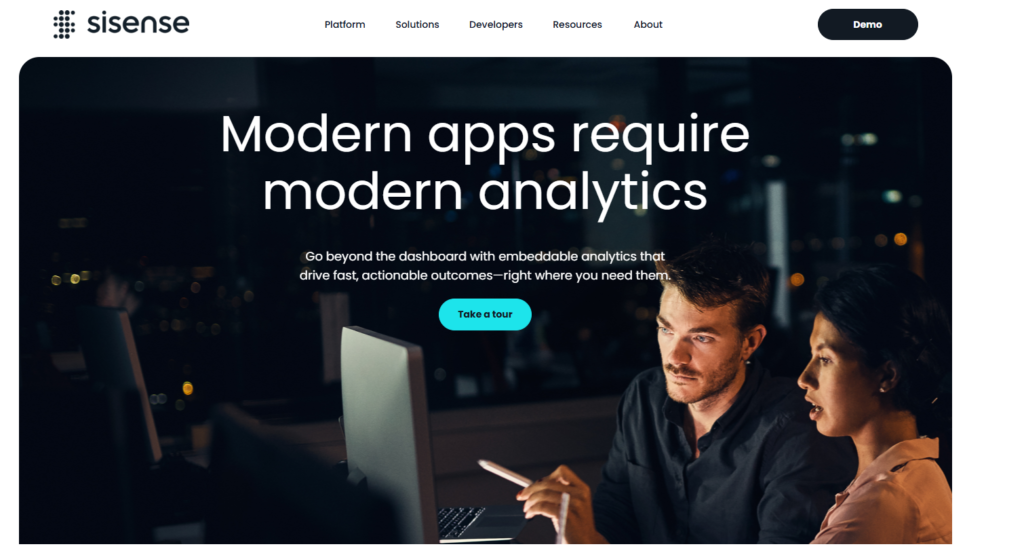
Able to embed analytics within SaaS products, is one of Sisense’s most standout features. It is adding value to the end-user experience as well as generating new revenue streams for SaaS providers. Sisense boasts a drag-and-drop interface, as well as powerful data processing tools, making its software a strong contender for SaaS businesses looking for an advanced BI solution.
7. How Does Zoho Analytics Support SaaS Growth?
Zoho Analytics — An affordable BI tool with extensive reporting and analytics functionalities. Its AI-based assistant lets users query data using natural language, which makes it easy for people without deep technical expertise to analyze data.
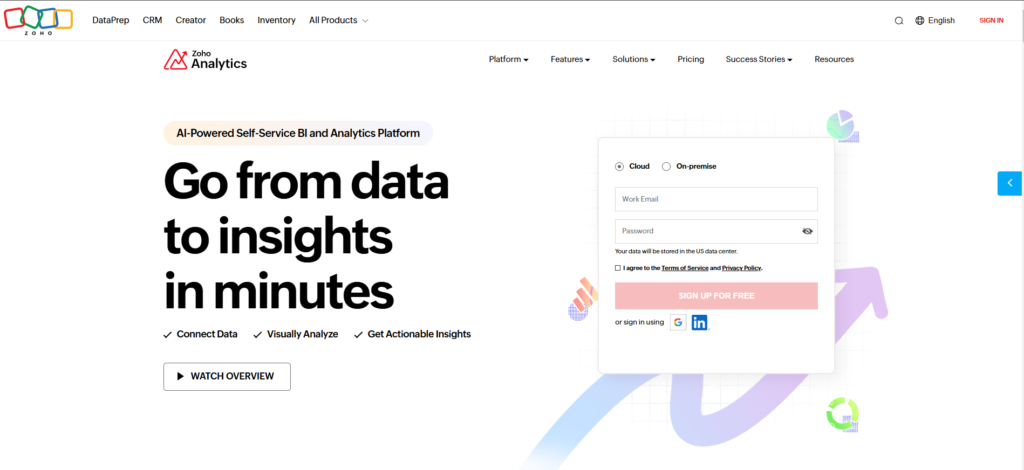
Pre-built connectors to new SaaS applications allow users to easily integrate their data. Moreover, Zoho Analytics’ collaborative functions help teams share reports and insights seamlessly. Zoho Analytics is the best business analytics platform for small to medium-sized SaaS businesses because it is affordable, yet powerful enough to help you gain insights.
8. Is Yellowfin BI the Answer to SaaS Product Analytics?
With features that twist data insights into stories, Yellowfin BI takes BI to a different direction altogether. This allows businesses to share insights more well in front of stakeholders.
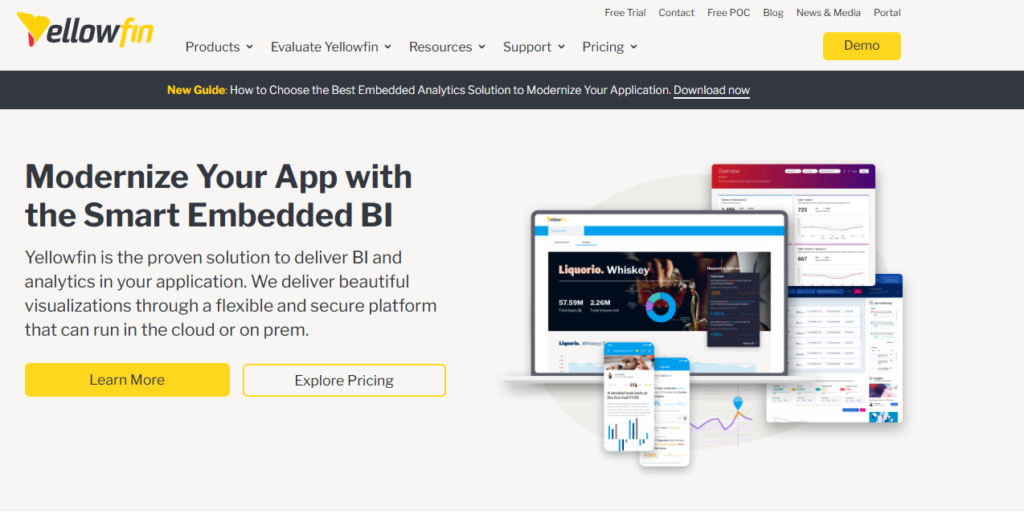
Users remain apprised of reputable developments in business performance via automated insights and alerts integrated into Yellowfin BI. The intrgrated collaboration tools allow for easy teamwork on data analysis. If you are SaaS companies who are planning to advance your product analytics and increase communication with your stakeholders, Yellowfin BI can be a good fit.
9. How Does SAS Visual Analytics Cater to Advanced SaaS Needs?
It has advanced statistical analysis and machine learning capabilities and is often positioned as a high-end BI tool. It has interactive dashboards that users can explore within a real time window.
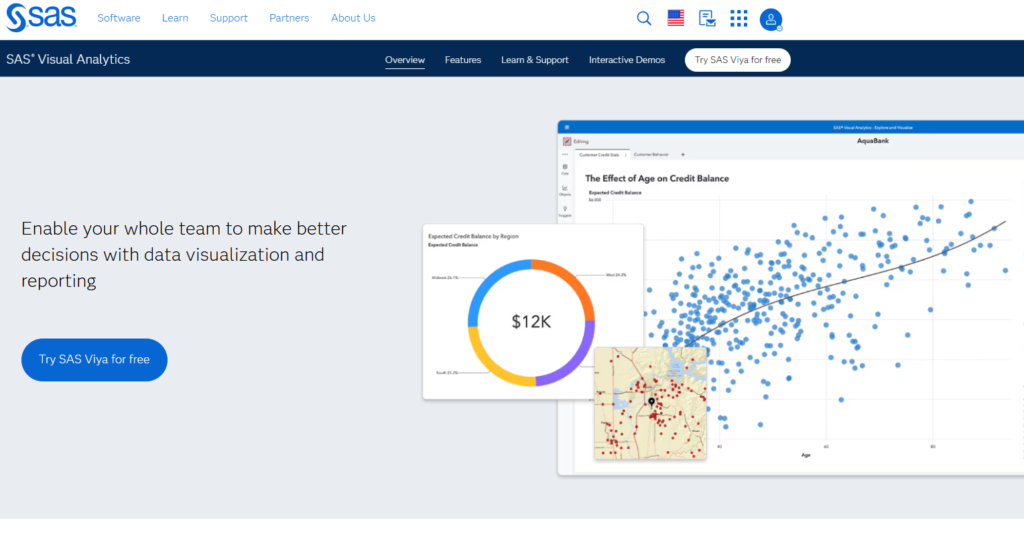
Among other reasons, this is why SaaS companies with complex datasets dealing with higher volumes prefer SAS Visual Analytics — it brings the depth and flexibility required. It incorporates machine learning both in it enabling predictive analytics which helps businesses anticipate future trends and make proactive decisions. This SaaS solution has an increased price tag, but it offers advanced features that are worth the investment for large enterprises.
How to Choose the Right Business Intelligence Tool for Your SaaS Company?
When deciding which BI tool to select for your SaaS business here are 10 factors to be well thought-out. Scalability is essential since the instrument must develop along with your small business and have the opportunity to cope with rising information volumes. Ease of use is another key factor; if the interface is user-friendly, even the non-technical members of the team will be able to utilize the tool effectively.
Integration capabilities — The BI tool must integrate smoothly with your tech stack, including CRMs, marketing automation platforms and financial software. The SaaS industry is all about customization and there is no one-size-fits-all for any SaaS business so you should look for tailored dashboards and reports. Last but not least, when we say cost, we are not only talking about licensing fees but also a broader range of costs, including implementation, training, and continuous maintenance costs.
Conclusion
In this age of B2B SaaS, data rules all. Data can make or break a company’s success, depending on its ability to gather, compile, and utilize that data. empower companies to analyze data and make better business decisions | Business Intelligence Tools| are the means of transforming the raw data into actionable insights such that they can transform the same into smarter business decisions and improve performance.
As a startup or an established SaaS provider, investing in the right BI tool can leverage your growth trajectory. Tableau, Power BI, Google Data Studio and Zoho Analytics, there’s no shortage of options. Assess your business needs, budget, and objectives to identify the tool that most closely aligns with your strategy.
Let’s get started with converting data into insights. Go ahead and check out these Business Intelligence Tools| and start to take your B2B SaaS business to a new height.
You might also be interested:


